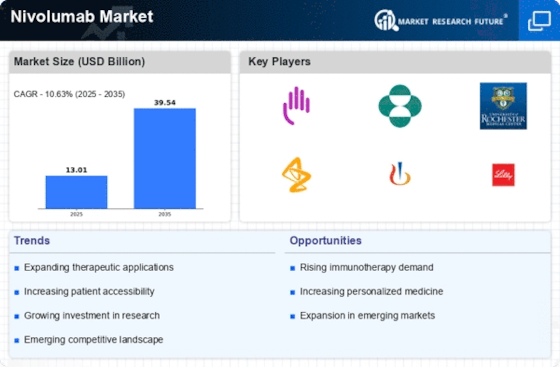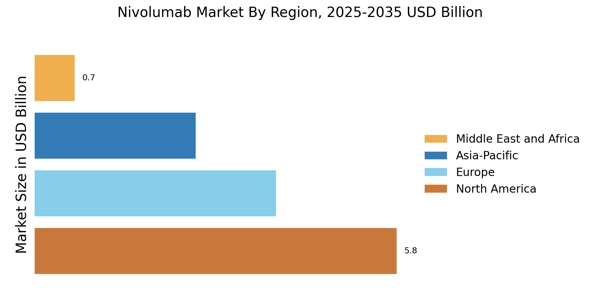Increasing Incidence of Cancer
The rising incidence of various cancer types is a primary driver for the Nivolumab Market. As cancer remains one of the leading causes of mortality worldwide, the demand for effective treatment options continues to escalate. According to recent statistics, the number of new cancer cases is projected to reach approximately 29.5 million by 2040. This alarming trend underscores the necessity for innovative therapies, such as Nivolumab Market, which has shown promising results in treating melanoma, lung cancer, and other malignancies. The Nivolumab Market is likely to benefit from this increasing patient population, as healthcare providers seek to incorporate advanced immunotherapies into treatment regimens. Furthermore, the growing awareness of cancer screening and early detection may contribute to higher diagnosis rates, further propelling the demand for Nivolumab Market and similar therapies.
Regulatory Approvals and Guidelines
The evolving regulatory landscape plays a crucial role in shaping the Nivolumab Market. Recent approvals from regulatory authorities for Nivolumab Market in various indications have bolstered its market presence. For instance, the approval of Nivolumab Market for previously untreated advanced non-small cell lung cancer has opened new avenues for patient access. Regulatory bodies are increasingly recognizing the importance of immunotherapies, leading to expedited review processes and favorable guidelines. This trend is likely to enhance the adoption of Nivolumab Market among healthcare providers, as they seek to align with the latest treatment protocols. Furthermore, the establishment of clear guidelines for the use of Nivolumab Market in combination therapies may facilitate its integration into standard care practices, thereby driving market growth. The Nivolumab Market stands to gain from these regulatory advancements, which may encourage further investment and innovation.
Expansion of Healthcare Infrastructure
The expansion of healthcare infrastructure is a significant driver for the Nivolumab Market. As healthcare systems evolve and improve, access to advanced cancer treatments, including Nivolumab Market, is becoming more widespread. Investments in healthcare facilities, particularly in underserved regions, are likely to enhance patient access to immunotherapy. Furthermore, the establishment of specialized cancer treatment centers is facilitating the delivery of Nivolumab Market and other innovative therapies. This trend is particularly relevant in emerging markets, where the demand for effective cancer treatments is surging. The Nivolumab Market may experience substantial growth as healthcare infrastructure continues to develop, enabling more patients to receive timely and appropriate care. Additionally, the integration of telemedicine and digital health solutions may further enhance access to Nivolumab Market, allowing for remote consultations and treatment planning.
Growing Patient Awareness and Education
The increasing awareness and education among patients regarding cancer treatment options are pivotal for the Nivolumab Market. As patients become more informed about immunotherapy and its benefits, they are more likely to seek out advanced treatment options like Nivolumab Market. Educational campaigns and support groups are playing a vital role in disseminating information about the efficacy and safety of Nivolumab Market, thereby empowering patients to make informed decisions about their treatment. This heightened awareness is likely to translate into increased demand for Nivolumab Market, as patients advocate for access to cutting-edge therapies. Additionally, healthcare providers are recognizing the importance of patient education in treatment adherence, which may further enhance the uptake of Nivolumab Market in clinical practice. The Nivolumab Market is expected to benefit from this trend, as patient-driven demand continues to shape treatment landscapes.
Advancements in Research and Development
Ongoing advancements in research and development are significantly influencing the Nivolumab Market. Pharmaceutical companies are investing heavily in clinical trials to explore the efficacy of Nivolumab Market in various cancer types and combinations with other therapies. Recent studies have indicated that Nivolumab Market, when used in conjunction with other agents, may enhance treatment outcomes and improve patient survival rates. The Nivolumab Market is poised for growth as these research initiatives yield positive results, leading to expanded indications and potential approvals from regulatory bodies. Moreover, the increasing collaboration between academic institutions and industry players is fostering innovation, which may result in novel applications for Nivolumab Market. This collaborative environment is likely to accelerate the development of new treatment protocols, thereby enhancing the overall market landscape.

















